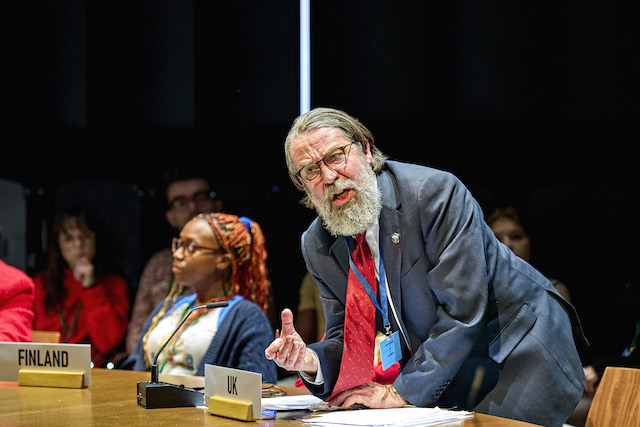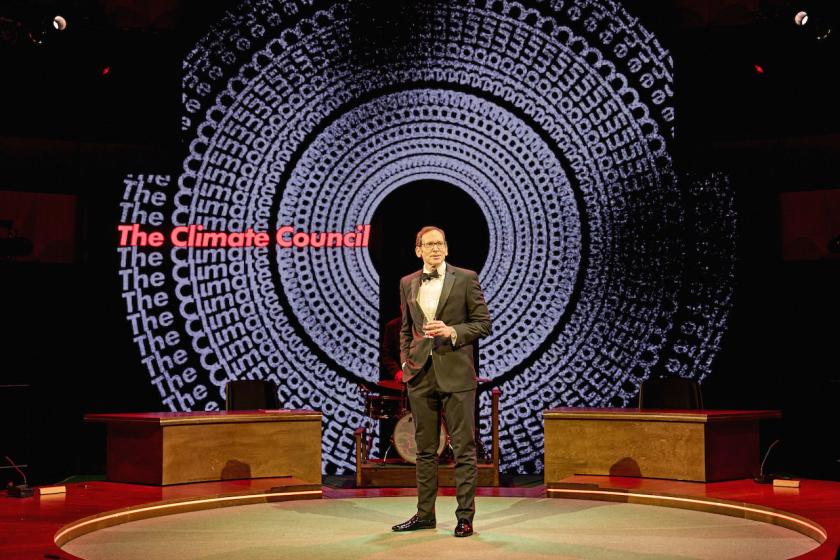It took a while for journalists to identify the chain-smoking, Machiavellian figure who was a permanent presence at early international gatherings to hammer out a strategy on climate change. When Time Magazine nominated “endangered” Earth as its planet of the year in 1989, politicians and climate campaigners leapt into action – but so too did the fossil fuel lobby, with the US lawyer Don Pearlman appointed as “High Priest” of this sinister “Carbon Club”.
Joe Murphy and Joe Robertson’s blistering, darkly witty play for the RSC about the negotiations that led to the Kyoto Protocol in 1997 – the first treaty to lock down targets to reduce greenhouse gas emissions – takes Pearlman as its liberal-baiting anti-hero. As Pearlman, Stephen Kunken – of Billions fame – is disconcertingly charismatic as he explains how after serving in President Reagan’s Department of Energy, he is approached by the group of oil companies known as the Seven Sisters to disrupt climate negotiations.
Murphy and Robertson are known as makers of electric political theatre, whether in their play The Jungle – based on their experiences of the Calais Jungle migrant camp while running a theatre company there – or in their subsequent refugee awareness-raising project, Little Amal. This play is much more about the devil in diplomatic detail, the potentially dry-as-dust haggling over semi-colons, verb tenses and sub-clauses that – in Murphy and Robertson’s skilful hands – becomes nothing less than an adrenaline sport.
Stephen Daldry and Justin Martin – who also directed The Jungle – expertly speed us through the legislative marathon, whisking the action between locations that include Geneva, Chantilly – Virginia, New York, Rio, and of course Kyoto. (Pearlman, inevitably, notes with enjoyment the carbon emissions collectively notched up by planet-saving politicians.) In real life his disruption strategy involved working through different Gulf-state members attending the International Panel for Climate Change (IPCC) meetings, here we see him recruit Raad Rawi’s representative for Saudi Arabia as a proxy for sowing verbal chaos and splintering scientific credibility. Miriam Buether’s slick design enables us to travel from one country to another without endangering the environment – Akhila Krishnan’s video projections at the back of the stage stylishly display charts, maps and shifting locations while the oval negotiating table remains a constant. As the cast members deftly juggle different roles, different personalities emerge, not least Ferdy Roberts (pictured above) as an immensely sympathetic, larger-than-life John Prescott, Kristin Atherton as a convincingly gimlet-eyed Angela Merkel, and Jorge Bosch as wise maverick Raúl Estrada-Oyuela.
Miriam Buether’s slick design enables us to travel from one country to another without endangering the environment – Akhila Krishnan’s video projections at the back of the stage stylishly display charts, maps and shifting locations while the oval negotiating table remains a constant. As the cast members deftly juggle different roles, different personalities emerge, not least Ferdy Roberts (pictured above) as an immensely sympathetic, larger-than-life John Prescott, Kristin Atherton as a convincingly gimlet-eyed Angela Merkel, and Jorge Bosch as wise maverick Raúl Estrada-Oyuela.
The play brings home the “chaos” effect of just one word on a diplomatic document – just as it was once posited that a butterfly flapping its wings could cause a storm in the Atlantic, so here the precise tense of a word can make the difference between whether or not an island will be allowed to sink. The dramatic counterpoint to Pearlman’s ruthless defence of capitalist assaults on the environment comes in the form of Andrea Gatchalian (pictured below), representative of Kiribati, a tiny archipelago in the middle of the South Pacific that is particularly vulnerable to rising sea levels.
It’s impossible not to admire the consummate skill with which Murphy and Robertson have compressed almost a decade of fraught debate, giving each meeting a sharp dramatic trajectory that it must have lacked at the time. (In the programme, the late Prescott describes the process as ‘diplomacy by exhaustion’.) Yet it’s also notable that Pearlman is by some margin the best fleshed-out character. As a result, this undoubtedly brilliant account tells us little we don’t know about ways of addressing global warming. It dazzles us in the moment but doesn’t throw a light onto the future.
 What it does do is show how the disinformation wars waged freely across the internet today were refined at the highest levels of a supposedly respectable US establishment. It's clear that there are far more sinister actors than Pearlman at large today, yet this Harvard/Yale educated lawyer was one of the figures who showed the substantial financial and political power of sowing doubt and confusion.
What it does do is show how the disinformation wars waged freely across the internet today were refined at the highest levels of a supposedly respectable US establishment. It's clear that there are far more sinister actors than Pearlman at large today, yet this Harvard/Yale educated lawyer was one of the figures who showed the substantial financial and political power of sowing doubt and confusion.
As we all now know, 2024 was the hottest year on record. In a week when another great climate change denier is about to be made President of the US, we can only wonder what it will take for those of Pearlman’s ilk to wake up to their short sightedness. From the play, however, this critic took away a further question. Was it Pearlman’s beliefs or his methods that caused the most long-lasting damage?














Add comment